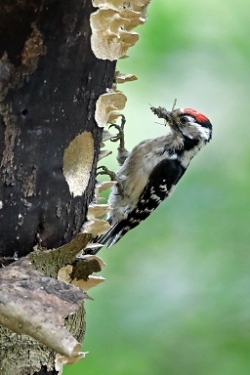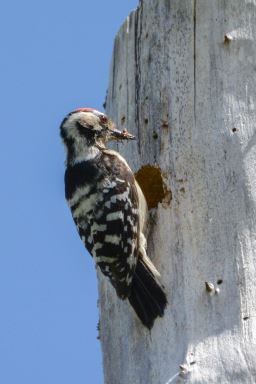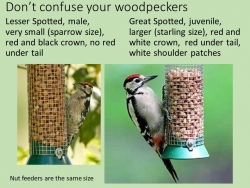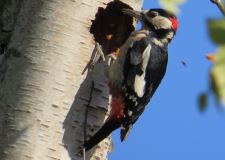Report on Breeding Lesser Spotted Woodpeckers in 2019 now available

The 2019 Report on breeding Lesser Spotted Woodpeckers is published.
Thanks everyone for your contributions to understanding breeding Lesser Spotted Woodpeckers and for finding so many nests in 2019!
This year we have excellent and important data from 23 nests in 9 different counties – our best year since we started the Lesser Spotted Woodpecker project in 2015.
How the abundance and timing of caterpillars affects nesting success of Great Spotted Woodpeckers

New research published. There has been a lot of attention recently on the impact of climate change on the timing of nesting and the availability of prey. We have been studying Great Spotted Woodpeckers since the 1980s and have used our data on the nests and defoliating caterpillars collected over the last 20 years to examine this. Our paper has just been published in the journal Bird Study.
Great Spotted Woodpecker nest hole orientation

It is great to see the coverage of nesting Great Spotted Woodpeckers in BBC Springwatch – they are brilliant birds.
We were interested to see that the woodpecker holes in the Scots Pines in Abernethy Forest tend to be orientated to the northeast. Our long-term studies of Great Spotted Woodpeckers in oak woodlands in Hertfordshire, southern England (see for instance Smith 2007) show a similar pattern even though the nest tree species and location are different from Abernethy.
Lesser Spots fledge successfully

A record 23 Lesser Spotted woodpecker nests are being monitored this year thanks to our dedicated observers. Young have fledged successfully from 19 nests (as of 7 June), one has been predated and we expect the last nest to fledge on 13 June.
So there is still time to find a nest and gather information.
Lesser Spotted Woodpecker breeding season update

LesserSpot Network observers are actively monitoring 11 nests, all found at the egg stage. This is great news as it gives us the maximum information about when and where problems arise for the birds.
We anticipate that more nests will be found now that the adults are more visible as they gather food for the chicks. Watching how often the birds feed the young and what type of food items are brought, all crucial information to help our understanding of these enigmatic birds
If you find a nest, please get in touch and we will help you monitor its progress and, if appropriate and/or possible, visit with our nest viewing camera to gather information on the number of chicks.
 Lesser Spotted Woodpecker by Richard Jacobs 2019
Lesser Spotted Woodpecker by Richard Jacobs 2019  Lesser Spotted Woodpecker © Tim Preston
Lesser Spotted Woodpecker © Tim Preston
Don't confuse juvenile Great Spotted Woodpeckers with male Lesser Spots - they both have red caps!

Newsletters
To download our newletters and reports, please use the links below:
Lesser Spotted Woodpeckers in 2019
